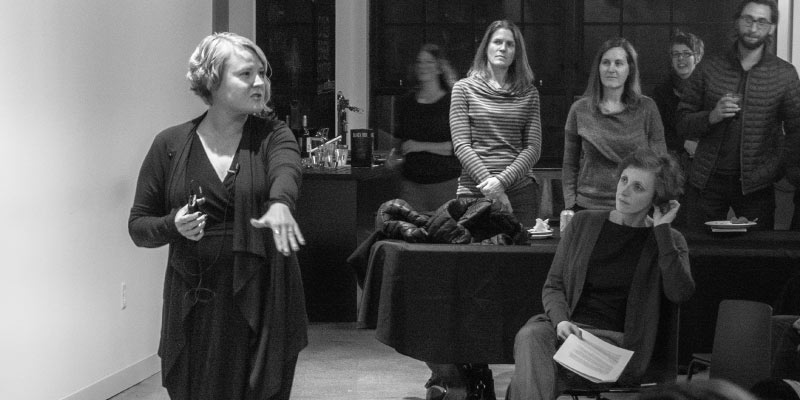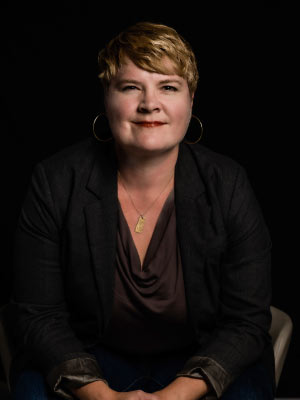
The effects of climate change are posing new challenges to cities, businesses, and even universities. Thankfully, people like Kate Nelson are here to help tackle these challenges and mitigate the effects of climate change. Nelson is currently the Director of Campus Sustainability at the University of Minnesota Twin Cities, but her career path wasn’t always intertwined with the world of climate.
Nelson initially graduated with a degree in theater from Cardinal Stritch University in Milwaukee, Wisconsin before spending a few years working as a production manager at a small theater company. Though theater was her creative passion, she didn’t feel like she could build a fulfilling career with it. A few years later, Nelson returned to the world of academia at the University of Wisconsin – Milwaukee, aiming to earn a second undergraduate degree. Nelson completed her degree in conservation and environmental science and in 2008 she was hired as the university’s first sustainability coordinator, where she helped develop UW–Milwaukee’s first climate action plan.
While working at UW–Milwaukee, Nelson returned to academia once again for her master’s degree, hoping to build her leadership skills and gain new expertise. To Nelson, “higher education is always worth investing in… it’ll always pay off.” Though UW–Milwaukee offered graduate programs, Nelson wanted an outside perspective where she could explore new ideas, bringing her to the Nelson Institute. “It was close enough to home — not necessarily in the sense of travel, but in being a familiar culture to enter into — but still different enough from Milwaukee,” says Nelson. She was also drawn to the institute’s professional master’s programs. “I’m very proud to say that I’m from the Nelson Institute and people from around the world know what I’m talking about.”
“Everything that comes out of our climate action plan has a name, a champion, next to it. I’m bringing together a wide range of knowledge across campus under an A-team of climate champions.” — Kate Nelson
After returning to UWM, Nelson was more prepared than ever to tackle the university’s climate action plan. At the time, there were only a handful of universities focusing on climate resilience, so the task was quite the undertaking. She and her team wanted to really focus on what climate mitigation looked like on a broader scale. When it comes to climate impacts, it’s hard to put borders on a region due to water and air flow, as well as soil erosion and displacement. To address this, she and two of her former colleagues, John Garner and Dr. Nancy Frank, spent a lot of time analyzing climate resilience across southeastern Wisconsin through the Milwaukee Metropolitan Sewerage District (MMSD). Together, they analyzed both the strengths and weaknesses of Milwaukee’s communities, environment, and infrastructure. For Nelson, “that really showed us how UW–Milwaukee could respond to what the region needed.”

“We really pushed ourselves to constantly be embedding climate mitigation with climate resilience at UW–Milwaukee,” says Nelson. One example of this is figuring out how to maintain the university’s cooling system. “Climate change is affecting Lake Michigan, so that affects our cooling system — not to mention, we expect a high increase of cooling demand going forward,” says Nelson.
UW-Milwaukee’s climate action plan is now moving forward in the hands of Jon Garner, the university’s interim sustainability manager. “I really pride myself in my time and investment in leading UW-Milwaukee’s plan so I could jump into the climate action plan for Minnesota,” says Nelson. Since starting her position with the University of Minnesota Twin Cities in winter of 2023, she has spent most of her time working on the university’s resilience assessment.
Although Nelson’s job titles at UW–Milwaukee and the University of Minnesota seem similar, her roles are very different. She elaborates, “in Milwaukee, I was in charge of the climate resilience planning and strategy, as well as a lot of the sustainable operations. Here, I’m in charge of the planning and strategy only.” Nelson was hired to lead UMN’s second climate action plan, building off of the goals of MPact 2025, the foundation set by the university’s president to guide the U of M through 2025.
Looking ahead, Nelson hopes to build on the progress that the University of Minnesota has already made. “There’s a really strong history of climate action that I’m very excited to be a part of, but now we’re facing goals that get a lot harder to achieve,” Nelson explains. The university has already cut greenhouse gas emissions by 50 percent, and Nelson’s goal is to reduce the remainder of emissions by 30 percent more by 2033. According to Nelson, the University of Minnesota hopes to be climate neutral by 2050.
Despite Nelson’s impressive achievements and ambitious goals, she asserts that her greatest accomplishment is building the teams to accomplish these endeavors. “It always came down to teams,” she says. “Everything that comes out of our climate action plan has a name, a champion, next to it. I’m bringing together a wide range of knowledge across campus under an ‘A-team’ of climate champions.” She suggests that this could stem from her love of theater, where a team works together to put on a beautiful production. Nelson summarizes, “I love building teams, I love running teams, I love seeing the accomplishments of others far more than myself.”